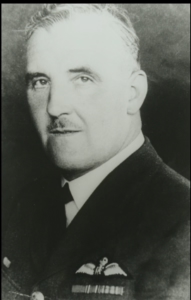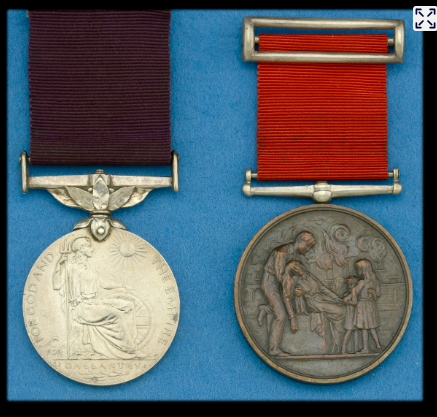b. 22/09/1899 Edinburgh, Scotland. d. 26/02/1991 Richmond, Surrey.
DATE AND PLACE OF GC ACTION: 24/05/1932 RAF Barton, Manchester.
Eric Watt ‘Jock’ Bonar was born in Edinburgh in 1899, and after school was apprenticed to Scottish Commer Cars – makers of petrol engine lorries. He volunteered during the Great War for service with the 7th Battalion, Cameron Highlanders whilst only aged 16. Bonar’s mother informed the Army that he was underage, and he was forced to return to his apprenticeship. When he was old enough he joined the Royal Navy and served in minesweepers as part of the Dover Patrol (entitled to the British War and Victory Medals). Having advanced to Petty Officer, Bonar was demobilised in 1919. After a brief foray into a motor cycle business in Glasgow, he decided to enlist in the Royal Air Force as a fitter:
Bonar was duly posted as a fighter pilot to 25 Squadron as its first NCO pilot, and was selected for the Gloster Grebes’ aerobatic display team. At one display King George V ordered the team by radio telephone to loop the loop, and afterwards Bonar was presented to the King, who was flabbergasted to find an NCO pilot among the officers. When he was offered the choice between a permanent commission and an instructor’s course at the Central Flying School, he opted for the course and in 1929 left the Service at the end of a seven year engagement.
His civil aviation career began as a joyride pilot giving flips round Blackpool Tower, and he became an established figure on the flying circus circuit.
Further detail as to what happened next is provided by an article written by John Wilson in The Life Saving Awards Research Society Journal, No. 73 (compiled from various newspaper coverage of the incident at the time, including the Daily Express, 25 May 1932):
‘At 14.10 on the afternoon of 24th May 1932, No. 341550, Sergeant Jack Treadwell, R.A.F. together with No. 560860, Leading Aircraftsman William Patrick Lane, R.A.F., No. 5 Training School took off from Sealand, Flintshire in a Siskin aircraft on a training flight. All was well until 14.35 when they were flying over Barton airfield near Manchester, where the airport staff assumed that he was coming in to land. However, the pilot attempted a roll manoeuvre at low altitude but upon reaching the top of the roll the plane stalled, and with insufficient height to recover the aircraft crashed behind a mound in a field near the airport’s perimeter, turned a somersault and caught fire.
Jock Bonar was seated in the aerodrome’s fire engine at the time and saw the crash. The fire engine and crew were on duty so were immediately able to speed off to the scene of the crash. At the same time, airport officials who had seen the plane stall, were quick to contact the ambulance.
Meanwhile, Police Constable Herbert Hayes, who was on motor cycle patrol near Barton Airport, also saw the airplane crash in flames and he drove his motor cycle across the aerodrome to a fence, and then climbed over and ran to the crash scene.
The flames were 30 feet high, but Constable Hayes found Flight Sergeant Treadwell strapped in the rear cockpit surrounded by flames. He immediately began to unstrap him from the seat, when Eric Bonar arrived with an asbestos blanket, which afforded him some protection from the flames. Despite his terrible burns Treadwell was able to recognise Bonar’s voice and cried out, “For God’s sake save me Jock, save me”.
With the fire crew and others spraying the flames with fire extinguishers, Bonar was quickly able to cut the remaining straps and Bonar and Hayes then pulled Sergeant Treadwell from the wreckage and into the arms of the bystanders. Doctors were on the scene within minutes and Sergeant Treadwall was rushed to hospital.
The Eccles Fire Brigade too were quickly on the scene and put out the fire.
LAC William Lane was not so fortunate. He was in the front of the plane and such was the damage that it wasn’t possible to reach him and attempt a rescue. Bonar said that when he first went to the plane it was obvious to him that Lane was already dead, most likely having been killed on impact. His body had to be cut out of the wreckage when the fire had been extinguished.
Treadwell was taken by ambulance to the Eccles and Patricroft Hospital where he was treated for serious burns to the face and was in severe shock… At first it was thought that he would survive his terrible burns injuries, and on one occasion he was able to make a statement regarding the accident. However, his condition gradually worsened and he died two weeks after the crash.’
For their bravery during the above incident, Bonar was awarded the E.G.M. and Police Constable Hayes was awarded the K.P.M. They were both also awarded the bronze medal of the Society for the Protection of Life from Fire (the rescue recorded in the Minutes Book No. 7, and Annual Report for 1933).
Two years after the above incident took place:
‘Bonar tried to take part in the MacRobertson air race to Australia in an American-built Bellanca. R. J. Mitchell, the designer of the Spitfire, gave him much advice during preparations for the race; but to Bonar’s disappointment his aircraft was withdrawn by his sponsors…. By the mid-1930s Bonar, who was an outstanding example of how far determination and a wicked sense of humour could take a bold man in the Depression years, was a popular figure in the rich man’s world of private aviation.
He had joined the staff of Personal Airways, an entrepreneurial outfit at Croydon formed to fly owners, trainers and jockeys to race meetings. When Personal Airways was contracted to open a flying school at Luton, Bonar took charge of the project; a control tower was built on to a farmhouse, and the piggeries were converted into the offices of the Luton Flying Club.
In 1938 Ronnie Shepherd, the chief test pilot of Rolls-Royce and a fellow member of the club, recruited Bonar as a development pilot for the Merlin engine – which was to power Hurricanes, Spitfires and other aircraft in the Second World War.’ (Obituary, The Daily Telegraph, 5 March 1991 refers)
Given Bonar’s somewhat lively character, and lifestyle, it is perhaps not surprising that:
‘At some point in the 1930’s Jock Bonar, decided that his medals would be of more use to him in resolving an outstanding financial matter, so his E.G.M. and SPLF medals were traded in settlement of a petrol and servicing bill…. Already in the Royal Air Force Volunteer Reserve, Bonar was granted an honorary commission as a Pilot Officer [August 1940].
Now came a moment of embarrassment, because in 1941 it had been decided that the E.G.M. would be exchanged for the George Cross; this was not a matter of choice – and the E.G.M. was expected to be surrendered to the Central Chancery. Bonar duly informed the Central Chancery that he had ‘lost’ his E.G.M. and in reply the Central Chancery’s Secretary said, “I would like to have your assurance that in the event of your recovering your Empire Gallantry Medal, that you will return it to me.”
No doubt Jock Bonar confirmed he would do just that, for he received his George Cross at an Investiture at Buckingham Palace on 23rd September 1941.
Bonar tested throughout the war, and spent some time with Napier putting the Sabre engine through its paces, which led to some hairy moments flying Hawker Typhoons and Tempests. Late in the Typhoon programme another test pilot took his place to explore its controllability in a dive. The tail came off in a pull-out, and he was killed.’ (article by J. Wilson in The Life Saving Awards Research Society Journal, No. 73, refer)
‘After his wartime career as a test pilot he freelanced in the charter market with a Miles Gemini, and later established his own aviation business at Croydon. In 1951 Bonar surrendered his pilot’s licence, though towards the end of 1980 he was permitted to fly Tiger Moths during a trip to Australia.
In his later years he helped his son develop a motor business, and then became one of the more rumbustious residents of the Star and Garter Home at Richmond, where he was wont to attribute his fitness, school-girl complexion and longevity to the beneficial effects of castor oil from aero-engines.’
Jock Bonar died in February 1991 at the age of 91, and up to his death was the oldest surviving holder of the George Cross. Bonar’s George Cross was sold at Glendining’s in September 1974, then appearing in a group with a BWM, VM (both listed as renamed), Defence and War Medals (privately named) and an unnamed Coronation 1953. The hammer price at the time was £500. In later life he was pictured wearing what was presumably a ‘copy’ group, which included G.C., BWM, VM, 1939-45 Star, Air Crew Europe Star, with ‘France and Germany’ clasp, Defence and War Medals, Coronation 1953 and Jubilee 1977 – the Second World War Campaign Awards he was undoubtedly not entitled to. A character to the end.
LOCATION OF MEDAL: PRIVATELY HELD.
BURIAL PLACE: CROYDON CREMATORIUM, CROYDON, SURREY.
ASHES SCATTERED BY SON AT SITE OF CROYDON AIRPORT.
Acknowledgement:
Marion Hebblethwaite – Image of Eric Bonar GC.



